P.S. From Paris (US Edition) Read online
Page 3
Paul remained silent for quite some time, then took a deep breath and thought that fainting in public would only make things worse. The final straw came when a woman, recognizing his face, interrupted their lunch to ask if his novel was autobiographical.
In a solemn tone, Paul told his friend that, having given it a great deal of thought over the past week, he was going to hand over the reins of the agency to Arthur. It was Paul’s turn to take a sabbatical.
“To do what?” Arthur asked, a little shaken up.
To disappear, Paul thought. In order to spare himself a lecture, he came up with an airtight pretext: to write a second novel, or at least try. How could Arthur object to that?
“If that’s really what you want. I mean, you did the same for me when I was having a tough time and ran off to Paris. So . . . where exactly are you headed?”
Paul hadn’t given the question a moment’s thought, and seized on his friend’s comment:
“Paris. You went on so much about it. The City of Light, all the wonders, bistros, bridges, the hustle and bustle of the arrondissements, the women . . . Who knows, with a bit of luck, maybe I can track down that gorgeous florist I heard so much about.”
“Maybe,” Arthur replied tersely. “But not everything was as magical as I made it out to be.”
“That’s because you were a mess, back then. I just need a change of scenery . . . to shake things up, get the creative juices flowing.”
“If that’s really why you’re going, then we’ll be happy for you. And when are you leaving?”
“Let’s have a dinner party at your place tonight. We can invite Pilguez and his wife, so the whole gang will be there to say good-bye. Then tomorrow, I’m off to France!”
Paul’s plan clearly saddened Arthur. Paul knew his old friend had thought about protesting, or trying to insist it would be better for the agency if he waited a few months. If the roles had been reversed, of course, Paul would have done everything in his power to help, knowing that work would sort itself out.
After saying good-bye, Paul went home in a state of absolute dread. What on earth had come over him? Moving to Paris! On his own!
Pacing his apartment, he began trying to come up with arguments in favor of this crazy, improbable escape. Arthur had done it, so why not him? The second argument, even more convincing than the first, concerned the charms of Parisian women. And the third was that, ultimately, he could actually try writing another novel . . . which he wouldn’t publish . . . or would only publish abroad. That way, he would be able to return to San Francisco once things had settled down. When all was said and done, there really was only one resounding argument: writer . . . American . . . single . . . in Paris!
And in Paris, where he had been living now for the past seven years, Paul had written five other novels. Growing wary of affairs with Parisian women, whose mood swings he found incomprehensible, he had chosen celibacy. Or maybe, more aptly put: celibacy had chosen him.
His five novels had not been as successful as he had hoped they would be. Not in Europe, anyway, or the United States. For some reason, however, they were very popular in Asia, and especially in Korea.
For the past few years, Paul had been romantically involved with his Korean translator. Twice a year, Kyong would come and visit him for one week, never any longer. She loved silence, and Paul was terrified of it. He sometimes imagined he had taken up writing precisely in order to fill the silence, the way ink filled a blank page. He and Kyong spent fourteen and a half days together every year, including trips to and from the airport.
When Kyong was there, he would spend hours looking at her without being able to tell if she was truly beautiful or only seemed so in his eyes. She liked when Paul looked at her with a gaze full of desire, and he was far more in love with her than he liked to admit. The only problem was that, when they were together, he could never find the right words, though words were supposedly his area of expertise—and hers too.
Although they didn’t see each other very often, they had their habits. Whenever she was in Paris, she liked to go to the cinema on Rue Apollinaire, as if the venue were more important than the film; she liked to walk across Pont des Arts, and to eat ice cream at Berthillon, even in the middle of winter. She seemed to like all those things more than his writing, the very thing that had brought them together.
Kyong remained on Paul’s mind when she wasn’t there, becoming perhaps even more present. Why did he miss her so much?
As soon as he finished writing a manuscript, she would begin her first one-week visit. Showing none of the exhaustion that would overcome any normal person who had just spent twelve hours traveling, she always looked fresh as a daisy. After a frugal lunch, consisting invariably of egg with mayonnaise, a slice of bread, and a glass of shandy (which perhaps was a miracle cure for jet lag—he really should test that out himself one day), which she would, also invariably, want to savor at the same café, on the corner of Rue de Bretagne and Rue Charlot, they would go up to Paul’s apartment. Kyong would take a shower, then sit at Paul’s desk to read the new manuscript. Paul would sit at the foot of the bed and watch her. This was inarguably a complete waste of time, as her face remained impassive while she read. It seemed to him that the question of whether or not she would leap into his arms depended on her assessment of the novel. As if her offer of “friendship and maybe more” translated to “more if I like your chapters.” For this reason, rather than expecting explicit feedback from the translator who was responsible for a substantial part of his income (since Paul lived off his Korean royalties), Paul sat tight until the moment when she would give herself to him.
He liked writing and living abroad. He liked Kyong’s biannual visits. Were it not for the fact that the price of this existence was a certain solitude throughout the rest of the year, he would have found his new life almost perfect.
The glass doors opened and Paul gave a sigh of relief.
Arthur was pushing a luggage cart while Lauren waved.
4
Mia opened her eyes and stretched. It took her a few moments to get her bearings, geographically and emotionally. She climbed out of bed, opened the bedroom door, and went to look for Daisy. Yet the apartment was empty.
Breakfast awaited her on the kitchen island, accompanied by a note in an old earthenware dish.
Seemed like you needed the sleep. Meet me at the restaurant when you’re ready.
Mia turned on the kettle and walked over to the window. By daylight, the view was even more stunning, as artists and locals filled the streets below on their way to the market, and she spotted the dome of Sacré-Cœur above the rooftops in the distance. She wondered what to do with her day, and the days to come. She looked at the oven clock and tried to imagine what David might be doing now; whether he was alone or making the most of her absence. Had she been right to leave, in hopes that he would miss her? Wouldn’t it have been better to stay and try to recapture what was lost?
Mia didn’t know what she wanted, but she knew what she didn’t want any more. The waiting, the silence, the suspicion. She wanted to rediscover her appetite for life and to stop waking up with her stomach in knots.
The sky was gray, but at least it wasn’t raining. That was a good start. She decided not to go and meet Daisy; instead, she would wander around Montmartre, poke about the shops, maybe even get her picture drawn by one of the many caricaturists. Totally kitschy, of course, but that was just what she felt like doing. In France, fewer people would recognize her. She was going to make the most of this freedom.
Mia rummaged through her travel bag, found an outfit, and then paused to give in to the temptation of exploring her best friend’s apartment. She ran her gaze over the white-painted bookcase, its shelves groaning under the weight of books. She pilfered a cigarette from the pack that someone had left on the coffee table, looking for any clue that might reveal the identity of its owner. Was it a man? A friend? A lover? Odd that Daisy hadn’t said anything. The mere thought that Daisy was
sharing her life with someone rekindled Mia’s desire to call David, to go back in time to before that film with the supporting actress who had caught his eye. That affair probably wasn’t the first, but actually standing by helplessly as it unfolded in front of her had been a cruel experience, to say the least. Out on the terrace, she lit her cigarette and watched it burn between her fingers.
She went back into the apartment and sat at Daisy’s desk. The screen of her laptop was locked.
Mia texted her friend:
What’s your password? I need to check my email.
Can’t you do that on your phone?
Not when I’m abroad . . .
Ha! Cheapskate.
Is that the password?
You’re kidding, right?
Well, then what is it?
I’m working. Chives.
????
That’s my password.
Imworkingchives?
Just “chives,” dummy!
Not much of a password.
Nope. And don’t even think of snooping through my files.
I wouldn’t dream of it.
Mia put down her phone and typed in the password. She logged in to her account and found a message from Creston asking her where she was and why she wasn’t answering her phone. A fashion magazine had requested a photo shoot at her home, and her agent needed her consent as soon as possible.
She began to reply, pausing for a moment to collect her thoughts:
Dear Creston,
I’ve gone away for a while, and I’m relying on your discretion. Please don’t tell anyone—and I mean anyone. In order to keep up this façade with David, I need to be alone, without taking orders from a director, a photographer, you, or any of your assistants. So: I will not be posing for a fashion magazine, because I don’t feel like it. I made a list of resolutions last night on the Eurostar, and the first was to stop being a pushover. I need to prove to myself that I’m capable of that, at least for a few days. I’m going out for a walk now, though I’ll be in touch soon. And don’t worry, you can count on my absolute discretion.
All the best,
Mia
She read it through, then hit “Send.”
A tab at the top of the screen caught her eye, and she clicked on it. Her eyes widened as she found herself staring at a dating site.
She had agreed not to go through Daisy’s files, but this was different . . . Besides, Daisy would never know.
She checked out the profiles of the men selected by her friend, burst out laughing at some of the messages she read, and spotted two bios that struck her as quite interesting. When a ray of sunlight glinted off the screen, she decided it was time to leave this virtual world and go outside into the real one. She turned off the laptop and borrowed a light jacket from the coatrack in the hallway.
After leaving the building, she walked up the street toward Place du Tertre, stopped outside a gallery, then continued on her way. A tourist couple stared at her. She saw the woman point and heard her say to her husband: “I’m sure it’s her! Go and ask!”
Mia sped up and went into the first café she came across. The couple waited outside the window. Mia stood close to the counter and ordered a bottle of Vittel, eyes glued to the mirror above the bar that reflected the street. She waited for the rude couple to get bored, then paid and left.
She reached Place du Tertre and was watching the caricaturists at work when a young man approached her with a friendly smile. Mia found him attractive in his jacket and jeans . . .
“You’re Melissa Barlow, aren’t you?” he asked in perfect English. “I’ve seen all your films.” Melissa Barlow was Mia Grinberg’s stage name. “Are you here on a shoot or just visiting?”
Mia smiled at him.
“I’m not here at all. I’m in London. You thought you saw me, but turns out it wasn’t really me. Just a woman who looks like me.”
“Sorry?” he replied warily.
“No, if anyone should be apologizing, it’s me. I realize that what I just said couldn’t possibly make any sense to you. So I’m sorry. I hope I haven’t disappointed you.”
“How could Melissa Barlow disappoint me when she’s back in England?” The young man nodded respectfully, started to walk away, then turned around.
“If you’re ever lucky enough to bump into her in London—it is a small world, after all—would you tell her that I think she’s a wonderful actress?”
“I certainly will. I know that would make her very happy. Very happy indeed.”
Mia watched him disappear into the distance. “Good-bye,” she whispered.
She fished her sunglasses out of her purse and walked a bit farther until she spotted a hair salon. It struck her that Creston would give her a severe talking-to, and this idea alone made her even more determined to put her plan into action. She pushed open the door, sat down in one of the chairs, and emerged one hour later as a short-haired brunette.
To test out her scheme, she sat on the steps of Sacré-Cœur and waited. When a tour bus with a United Kingdom license plate stopped in the square, Mia walked up to it as the passengers were getting off and asked the tour guide for the time. Sixty people, and not one of them recognized her! She blessed the hairdresser who had given her a new identity. Now she was just a simple British tourist visiting Paris.
Paul circled the block twice before finally double-parking. He turned to his two passengers with a big smile.
“I hope you two aren’t feeling too out of whack . . .”
“What, from your driving?” Arthur replied.
“Have you ever told him about that night when I spent two hours curled up under an operating table because of him?” Paul asked Lauren.
“Yes, she has. Only twenty times or so,” Arthur answered. “Why?”
“No reason. Here are the keys. Top floor. Bring up your bags while I find a place to park.”
Lauren and Arthur were busy unpacking their bags in their room as Paul came in.
“It’s a shame you couldn’t bring Joe with you,” he said with a sigh.
“It’s a long trip for a kid his age,” Lauren explained. “He’s staying with his godmother, which I think he’s pretty happy about.”
“Right, but he would have been even happier if he were staying with his godfather.”
“The two of us were kind of hoping for a romantic getaway,” Arthur pointed out.
“Romantic getaways come and go. You have time for that. I, on the other hand, very rarely get to see my godson.”
“Move back to San Francisco—you’ll see him every day!”
“Do you two feel like having something to eat? Where did I put that cake?” Paul muttered, riffling through his kitchen cupboards.
Lauren and Arthur exchanged a glance, which he caught.
Smiling at their silent humor, he made coffee and then outlined the schedule he’d drawn up.
As it was sunny, the first day would be spent sightseeing: Eiffel Tower, Arc de Triomphe, Île de la Cité, Sacré-Cœur. And if they ran out of time, they could continue their tour the next day.
“Right . . . and the ‘romantic’ part of the getaway?” Arthur reminded him.
“Oh . . . yeah,” said Paul, a little embarrassed.
Lauren needed a rest before such a marathon, suggesting the two friends eat lunch without her to catch up.
Paul offered to take Arthur to a nearby café with a sun-drenched terrace.
Arthur put on a clean shirt and followed him out the door.
Sitting at a table, the two men looked at each other for a moment without speaking. As if both were waiting to see who would speak first . . .
“So, you’re happy here?” Arthur finally asked.
“Yeah. Well, I think so.”
“You think so.”
“Who could ever be sure that they’re really happy?”
“Nice Zen koan, or whatever that was, but don’t dodge the question.”
“What do you want me to say?”
Arthur s
hrugged. “Just tell me the truth.”
“I love my job, even if I still sometimes feel like a fraud with only six novels. Apparently, lots of writers feel that way.”
“So you do see other writers.”
“There’s a writing club not far from here. I go one night a week. We chat, talk about writer’s block, and then end the evening in a bar. It’s funny—listening to myself describe it, it does sound kind of dull.”
“I won’t argue with that.” Arthur offered up a smile.
“So what about on your end? Is the company booming?”
“We’re talking about you, Paul.”
“I write. That’s all there is to say, really. I go to a few book fairs. Sometimes I do book signings in shops. Last year I went to Germany and Italy, where my books are doing okay. I work out at the gym twice a week, which I hate, but I really don’t have much of a choice, given what I eat. Apart from that, what else can I tell you? Ah, yes. I write. Which I’m pretty sure I already mentioned.”
“Sounds like a real barrel of laughs,” Arthur said.
“Well, I guess I’m happiest at night . . . being with my characters and all . . .”
“Are you seeing anybody?”
“Yes and no. She’s not here very often—hardly ever, I guess, but she’s on my mind constantly. You know what that’s like.”
“Who is she?”
“My Korean translator. Not too shabby, eh?” Paul said, trying a bit too hard to sound jovial. “Yep, I’m huge in Korea. It’s too hard to visit, though. I still haven’t recovered from the flight over here.”
“That was seven years ago,” Arthur exclaimed.
“Feels like yesterday. Eleven hours of turbulence. It was a nightmare.”
“Well, you will have to come back one day, you know.”
“Not necessarily. I’ve got my resident card now. Though I guess I could take a boat back . . .”
“And this translator?”
“Kyong is wonderful, even if I don’t really know her all that well. Long-distance relationships can be a bit tricky.”

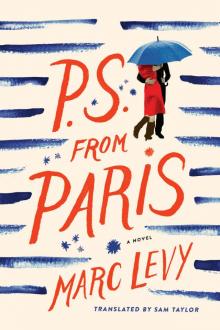 P.S. From Paris (US Edition)
P.S. From Paris (US Edition)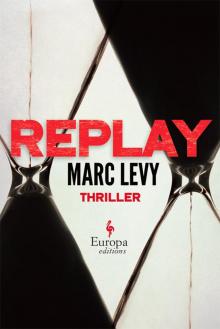 Replay
Replay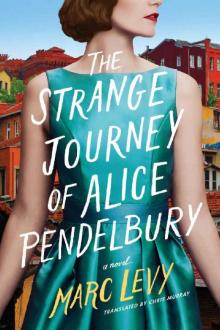 The Strange Journey of Alice Pendelbury
The Strange Journey of Alice Pendelbury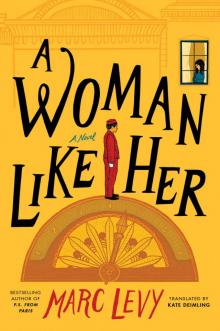 A Woman Like Her
A Woman Like Her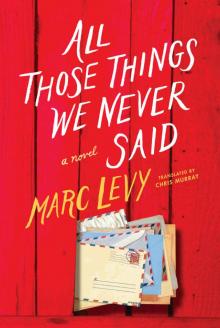 All Those Things We Never Said
All Those Things We Never Said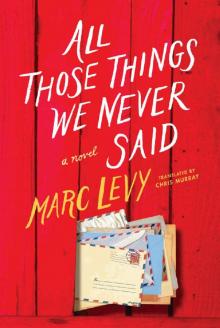 All Those Things We Never Said (US Edition)
All Those Things We Never Said (US Edition)